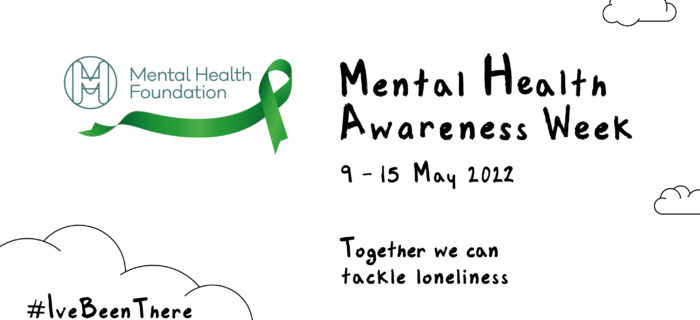
Today marks the launch of Mental Health Awareness Week, the UK’s national week to raise awareness of mental health. The week, which is hosted by the Mental Health Foundation, is in its 22nd year and runs from 9 to 15 May.
This year, the theme for the week is ‘Loneliness’. Across the country, people will be reflecting on loneliness and how it impacts our mental health. Long-term loneliness is closely linked to mental health problems such as depression and anxiety.
Mark Rowland Chief Executive of the Mental Health Foundation said:
“We hope this year’s theme of loneliness will strike a chord with many of us who felt lonely and struggled throughout the Covid pandemic.
Millions of us experience loneliness from time to time. We know that some people are at higher risk of experiencing loneliness and the evidence shows the longer we feel lonely, the more we are at risk of mental health problems.
Loneliness deserves more attention and we’re calling on everyone who has struggled as a result of being lonely to share their experiences. We must work together – as individuals, as a society and through government policy – to reduce loneliness and prevent mental health problems by investing in welcoming, social spaces and new community initiatives.”
It’s important to take care of yourself and get the most from life. Below are 10 practical ways to look after your mental health. Making simple changes to how you live doesn’t need to cost a fortune or take up loads of time. Anyone can follow this advice. Why not start today?
Talk about your feelings
Talking about your feelings can help you stay in good mental health and deal with times when you feel troubled.
Keep active
Regular exercise can boost your self-esteem and can help you concentrate, sleep, and feel better. Exercise keeps the brain and your other vital organs healthy, and is also a significant benefit towards improving your mental health.
Eat well
Your brain needs a mix of nutrients in order to stay healthy and function well, just like the other organs in your body. A diet that’s good for your physical health is also good for your mental health.
Drink sensibly
We often drink alcohol to change our mood. Some people drink to deal with fear or loneliness, but the effect is only temporary.
When the drink wears off, you feel worse because of the way the alcohol has affected your brain and the rest of your body. Drinking is not a good way to manage difficult feelings.
Keep in touch
There’s nothing better than catching up with someone face to face, but that’s not always possible. You can also give them a call, drop them a note, or chat to them online instead. Keep the lines of communication open: it’s good for you!
Ask for help
None of us are superhuman. We all sometimes get tired or overwhelmed by how we feel or when things don’t go to plan.
If things are getting too much for you and you feel you can’t cope, ask for help. Your family or friends may be able to offer practical help or a listening ear.
Local services are there to help you.
Take a break
A change of scene or a change of pace is good for your mental health.
It could be a five-minute pause from cleaning your kitchen, a half-hour lunch break at work, or a weekend exploring somewhere new. A few minutes can be enough to de-stress you. Give yourself some ‘me time’.
Do something you’re good at
What do you love doing? What activities can you lose yourself in? What did you love doing in the past?
Enjoying yourself can help beat stress. Doing an activity you enjoy probably means you’re good at it, and achieving something boosts your self-esteem
Accept who you are
We’re all different. It’s much healthier to accept that you’re unique than to wish you were more like someone else. Feeling good about yourself boosts your confidence to learn new skills, visit new places and make new friends. Good self-esteem helps you cope when life takes a difficult turn.
Care for others
‘Friends are really important… We help each other whenever we can, so it’s a two-way street, and supporting them uplifts me.’
Caring for others is often an important part of keeping up relationships with people close to you. It can even bring you closer together.
For more information on the week, please visit the Mental Health Foundation website.

